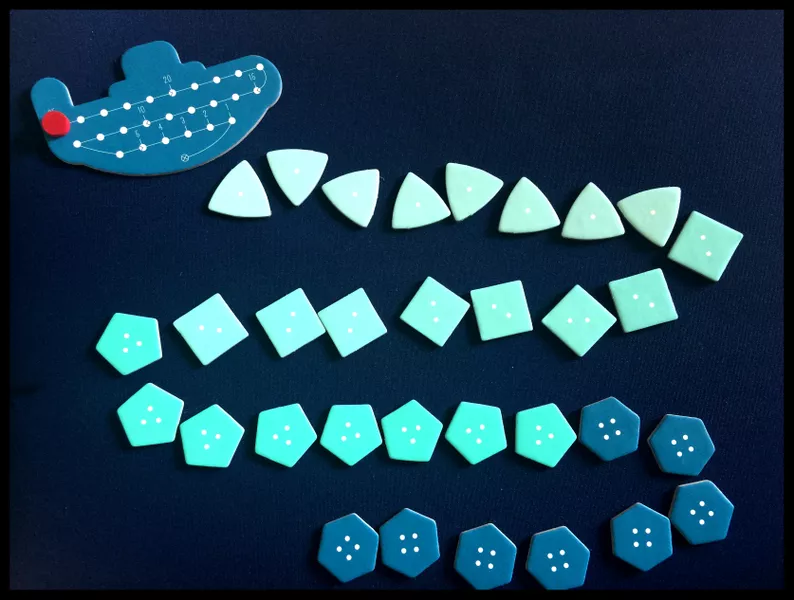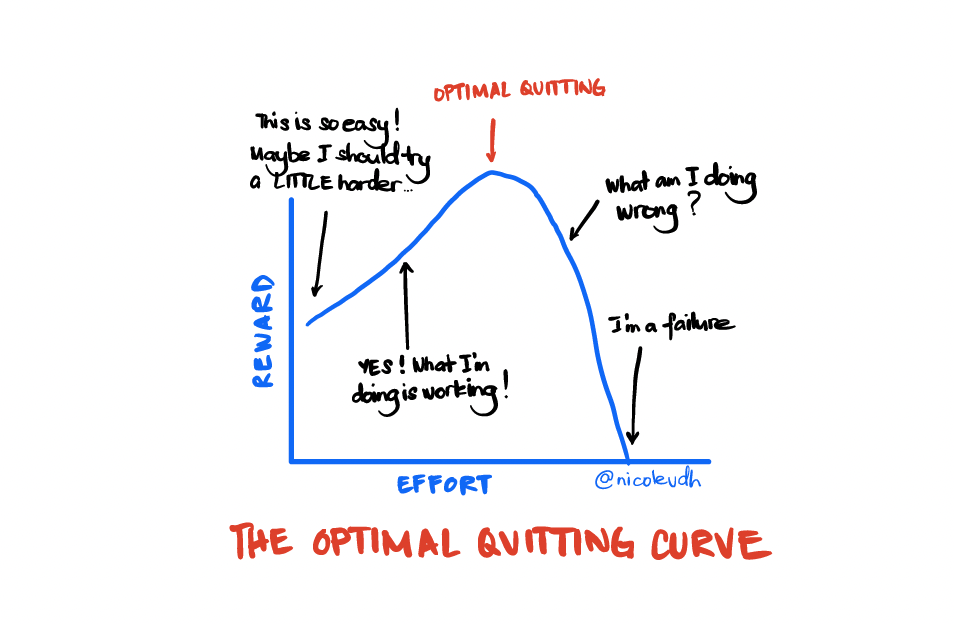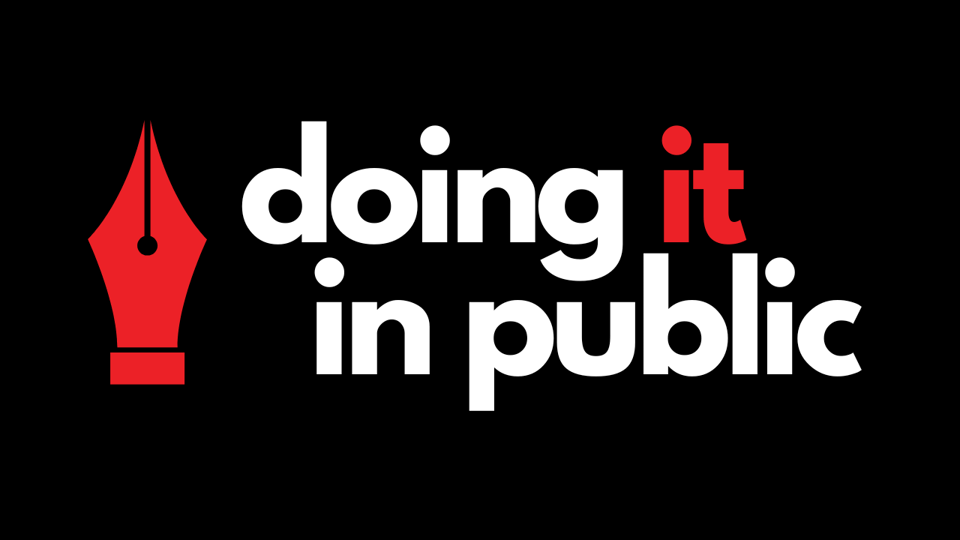Thinking in Public: Optimal quitting (#02)
In this issue: The Optimal Stopping Problem | Ritual dissent and black hats | Links | Changelog

This photo is of a small game called Deep Sea Adventure that I find strangely addictive-- mostly because I'm terrible at it.
The rules work like this: Players take the roles of deep-sea divers. You start off in the submarine, and on your turn, you roll two standard six-sided dice and move the indicated amount of tiles (with the darker ones being the deepest ones). When you land on the tile, you take it-- along with the treasure it represents. And the deeper tiles are worth more treasure.
At the end of the game, everyone adds up their treasure. The player with the most treasure who makes it back to the submarine by the end of the game wins.
Here's the catch: you have limited air. As soon as the game starts, you're losing air. And you lose more air with each treasure you carry. So, on each turn, you're faced with a decision: do you keep going deeper, collecting more treasures? Or do you turn back to the safety of the submarine?
I have played this game over a dozen times (it plays in 30 minutes or less), and I have never won. I always want to go deeper, get more treasure, and inevitably fail to make it back to the submarine in time. Despite attempting to correct this tendency, I always burn more air than I intend to, spend too long collecting treasure, and wander too deep into the sea.
The reason I'm bad at it is that I don't know when to quit.
And you know what? You probably don't, either.
The Optimal Stopping problem
It turns out that most of us are bad at identifying the best time to give up on a course of action. This is partially due to our society, which inordinately values perseverance. Being called a "quitter" is not a good thing; it's a slur with negative connotations: being flighty, indecisive, or unable to commit.
Recently, I've noticed a lot of YouTubers quitting or cutting back significantly. YouTubers with millions of subscribers. Their reasons are all the same: burnout, the feeling of managing teams more than they're creating, and the fact that even a dream job is still a job. But I think the problem is not that they are quitting. The problem is that they didn't quit optimally.
The Optimal Stopping problem is sometimes called the Secretary Problem, and the hypothetical problem goes like this: You must hire a secretary, and you fortunately have candidates for the position. The problem is that you have so many candidates that if you waited to make someone an offer until you saw them all, the chances that the candidate would have found another job are pretty high.
Interviewing everyone will likely get you no one. So how many do you interview before you make an offer? How quickly are you willing to commit?
The Secretary Problem is only one illustration of the Optimal Stopping problem. If you're selling your house, how do you know which offer to accept and which to turn down? Do you stick it out at your job, or quit it and look for another? Do you hunker down and learn the note-taking app you're already using, or should you try that shiny new app on the horizon? Should you stay, or should you go?
Doing anything creative for a significant amount of time looks like this:

In the beginning, you produce something with minimal effort and get a lot of positive feedback. You start to think that if you just put in a little more effort, you could really make something cool.
So you buck up and put in the work, which pays off! People like what you're doing, and it seems like everything you're doing is a winner. So you ramp up your effort and continue to eke out more rewards.
At some point, you realize you're trying harder than ever, but you're not getting as much back in return. You start to doubt yourself. Maybe you could just work harder.
You work harder and harder and harder until you crash and burn, spectacularly. You burn out.
Why don't we quit earlier?
It's not just social conditioning-- there are a lot of cognitive biases at play here. We irrationally take into account the effort we've already expended in the past when making projections about the future (sunk cost fallacy). We don't take into account opportunity costs. We place undue importance on things that we've built (the Ikea effect)-- one of the reasons why developers shouldn't be the only ones testing their code. We work so long that we experience an enmeshment of our jobs with our identities: what we do becomes who we are... and how can we quit who we are? And finally, we quit less frequently and more belatedly when we're being observed.
How can we correct this tendency in a way that actually works?
Ritual dissent and black hats
One of the best ways to ensure we quit optimally is to cultivate a ritual of dissent. Developed by Dave Snowden, ritual dissent is a facilitation method where people systematically attack an idea in a structured way. The ritualization of the disagreement establishes consent-- it's akin to Edward Bono's Six Thinking Hats, where the physical act of putting on a black hat signifies that you are playing the role of a critic, rather than being one by your very nature.
Ritual dissent can help us quit: forego lines of inquiry, rethink conclusions, refuse overwork, abandon failed experiments, and back out of intellectual rabbit holes.
When learning in public, even more damaging than trolls and shitposters are the ruinously empathetic: those who mean well, but only ever tell you that you're doing a good job... even when you're not. In the face of our collective tendency to quit too late, here's how to incorporate ritualized dissent into the act of creating something:
Come up with exit criteria before you begin something: a list of conditions for quitting. This is particularly useful in software testing, because exhaustive testing is impossible and impractical, and also in investment, where asset allocations are defined upfront to prevent panic-selling at the worst possible time.
Use the Hegelian Dialectic or steel manning to attack our own ideas as well as others'.
Create an inner circle of people you trust and ask them to act like your quitting coach. Cultivate relationships with people who challenge you, who care about you enough to look critically at what you make and ask you, "Where's the poop?"
When you're ready to go public, ask others for their opinion. Ask specific questions ("In what situations is this idea wrong?" instead of "Could you review this, please?") that pass the Mom test.
Listen to all criticism like everyone's wearing black hats.
If you'd like to participate in some ritual dissent, reply to this email with at least one point I made that didn't quite hit the mark for you.
[[Links]]
📕 This issue was heavily influenced by Quit: The Power of Knowing When to Walk Away by Annie Duke. Here are my Kindle highlights, and here are my literature notes on this book.
📕 Algorithms to Live By, by Brian Christian, is a book that's right up my alley. It's about how to turn mathematical algorithms into heuristics that can be applied to human problems.
🖊️ I routinely reread this Manifesto for posting online in 2023 as a way to remind myself of when to quit spending energy on internet trolls.
💻 Quartz is a static site generator for Markdown files that plays particularly well with Obsidian, and I'm using it for my in-progress book.
🎥 Notion recently released a new calendar feature that everyone seems to be raving about. Here's a more balanced take on it by Wesley Anna.
🖊️ Readwise's January release is out, and with it are some nice new features:
Exportable summaries so that you can have AI-generated summaries of articles sent to Obsidian or other note-taking tools
Custom email addresses instead of the difficult-to-remember hash they were using for you to send documents by email
Bundles, which are shareable links to Readwise filtered views. Practically, bundles are a way to share a set of links with people who don't necessarily have to use Readwise. Here's a bundle I made for things I recommended in this newsletter issue!
📕 Fourth Wing (The Empyrean Book 1) by Rebecca Yarros is a high-fantasy novel that I absolutely could not put down (thanks for the recommendation, Andy). It's got dragon riders, magic, and a lot of angst.
💻 Peerdraft is both a web app and an Obsidian community plugin that finally brings real-time collaboration to Obsidian notes by establishing peer-to-peer connections.
🖊️ The Obsidian Gems of the Year 2023 winners have been announced, and I am lucky enough to have been named among them (in the Best Content category). The rest of the list, though, is a good roundup of the best things that came out of Obsidian last year-- I know I'm slowly working through that list myself!
🎲 I really enjoyed watching Deconstructing and rebuilding RPG design on the YouTube channel Dungeon Masterpiece with Kelsey Dionne, designer of the awesome game system Shadowdark. They talked about getting in a flow state, the iterative work of creation, and how sharing your work keeps you constantly improving.
🎧 Snipd: Learning hard things on Deep Questions with Carl Newport touched on Newport's thoughts on PKM, most of which I disagree with. I value him as a thinker because he says some things I strongly agree with (such as his stuff on Deep Work) and some things I strongly disagree with (such as his views on PKM and Digital Minimalism).
🎧 Snipd: Fucking Feelings: The Attunement Model of Consent on Fucking Cancelled pointed out the flaws in the enthusiastic consent model and proposed a less extreme alternative. It had me updating my note on consent as a result.
🎥 Arc, which has been my browser of choice for the last year, just announced some cool features on their roadmap, including Arc Explore, a combination of a search engine and a browser that intelligently answers your questions. For example, searching for a cooking recipe returns a page that has recipes, an ingredient list, and videos for how to make the dish. It does preliminary research and collates them in a nice package, bypassing search engines and all the ads and cookies for most sites.
💻 Mastodon addressed a pretty significant security issue today-- one that let attackers impersonate and take over and remote account. The Mastodon service that I co-own and manage with my friend Andy Polaine, pkm.social, has already been updated to v4.2.5 to address this. On the one hand, the news of the vulnerability is quite alarming. On the other hand, it's because Mastodon is open-source that these issues are at least disclosed.
🖊️ Oliver Burkeman published a piece in his newsletter, The Imperfectionist, that made me feel called out: Allow other people their problems, about not being responsible for others' emotions.
🎥 Zsolt Viczián's Obsidian Excalidraw plugin just got the ability to crop images from PDFs without losing the link back to the original PDF. Zsolt's single-handedly making Obsidian a decent visual PKM tool.
[[Changelog]]
Here's stuff I've created in public in the last three weeks (since the previous issue).
I'm writing a book on learning in public, and it's called Doing It in Public. Check out the outline here, and tell me: what's one thing that's missing from it?

NVDH - PKM and productivity
Learning new things in Obsidian (2024) - In defense of remembering is a response to Oliver Burkeman's How to forget what you read.
I made a video on How to publish your notes for free with Quartz and a note on it with text instructions and screenshots.
I talked about the top 10 ways I learn in public.
I published the following shorts: on my version of the Vault Changelog plugin, on hiding properties in Obsidian Live Preview, and on my experience using the Obsidian 3D Graph plugin.
For my Patreon, I released an experimental audio podcast and a video tutorial of Canvas Candy.
I updated my ethics statement to add a general Code of Conduct for communities I create or join.
Grafana Labs - observability and performance
How to do continuous profiling right, with Grafana Pyroscope and Ryan Perry
Adobo & Avocados - intersectionality in tech
Changing directions in software testing, with Maria Kedemo
Mental health as a superpower, with Karen Todd
How to get started in DevRel, with Gertrude Westrin
If you'd like to meet me in person, I'm currently at FOSDEM 2024 in Brussels, Belgium. It's a free event, and for the first time, I didn't submit a talk, so I'm eager to talk to people.
On March 22-23, I'll speak at PKM Summit in Utrecht, the Netherlands. I'm not sure what it'll be about yet, but I'm thinking about recording a video for my channel in public.
Thanks for reading! Obrigada!
If you'd like to support me, you can: buy my course Obsidian for Everyone, sign up for my Patreon, or tell others about this newsletter! Some of the links in this issue are affiliate links, but I only use them for things I love.